I Talk Shit Cause I Know It's True
A few words on truths, inspired by my friend Imani—dispatches from ComplexCon (with audio), thoughts on how Black women are discussing thinness online, articles & more.
Happy Sunday, friends!
This weekend, I swung by Teen Vogue’s Summit in Hollywood, where Alex Consani, Law Roach, Kristen Noel Crawley, Latto, and the lovely editors of the publication put on a solid day of programming for Gen Z.
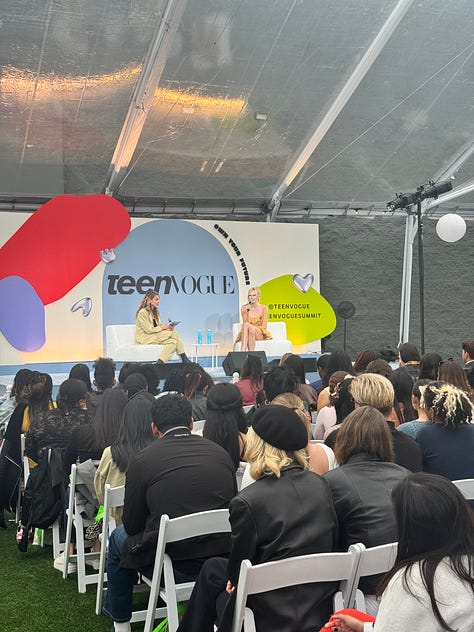
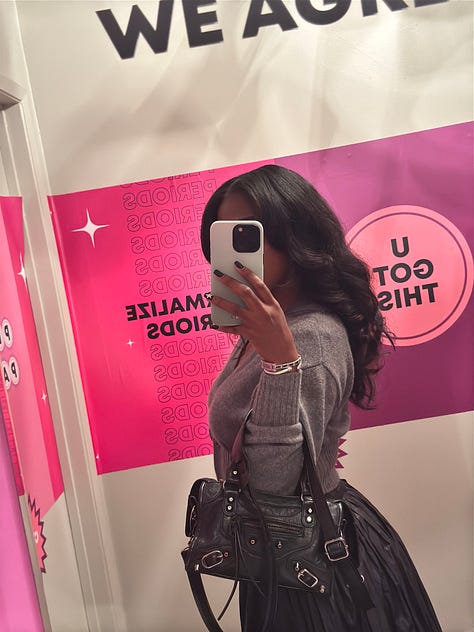
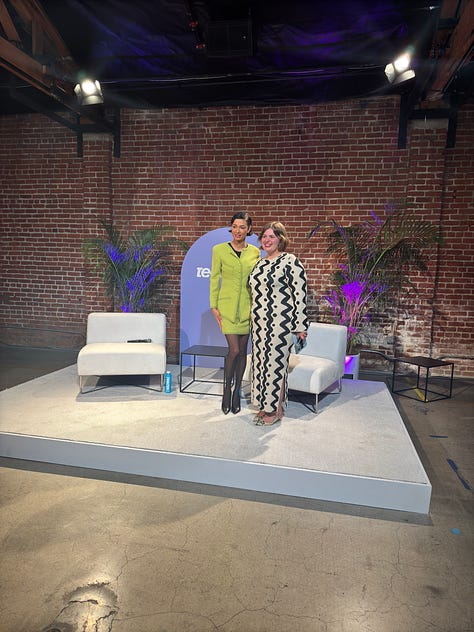
Today, I wrote, tidied up my bathroom, brunched, and enjoyed a lineup of beverages — chai, iced coffee, San Pellegrino, and a Hiyo. I went for a 3-mile stroll, watched the original Alice in Wonderland with my cousin (a movie that's foundational to how I view the world, myself, and whimsicality), and had one of those phone calls where ideas bounce around effortlessly with my girlfriend, Imani. We talk about a lot, in a "we should start a podcast" kind of way, and on this call, we somehow landed on the idea of truth and narratives.
Imani — the same brilliant strategist and florist I mentioned earlier — once tweeted, “The only narrative you have to align yourself with is the truth.” I relentlessly bookmark, screenshot, and document the musings of my closest girlfriends because they are just as resonant, thoughtful, and foundational to my thinking as any revered cultural figure.
Her words remind me of this Ida B. Wells quote, "The way to right wrongs is to turn the light of truth upon them." The truth — whether hard facts or the things I intuitively know about myself and my character — has kept me both grounded and propelled me forward. It's the reason I write out affirmations: because there is a version of the world and of myself that I know is true, and I’m committed to holding it close. There are a lot of narratives growing in our cultural zeitgeist. Later in this newsletter, I'll discuss what a single Black woman's 30-second TikTok says about skinniness and worthiness.
I don’t have big, expansive thoughts about Imani’s words, but I repeat them to myself often. Whenever I’m nervous, self-conscious, or thinking about the way my sweater falls over my love handles, or whether my expressions of concern when my friends are freaking out seem sincere enough, I return to the facts — what I know is true. 2024 hasn’t been particularly easy for me; that’s another story for another day.
Here's my truth for the week in true Imani fashion and celebrating Kendrick’s new album. Feel free to share your thoughts in the comments.
The Big Things
How Black Women Are Talking About Thinness Online
I’ve always believed that the least interesting thing you can be is thin, but each semi-generation regurgitates its hyper fixation with sizes 00-4, so something is pulling us back to talking about thinness and the pursuit of it. Oh, it’s undeniably lucrative in the attention economy. This week, the podcast host of Rich Little Broke Girls—a show aimed at aspiring housewives and CEOs—entrepreneur and influencer Slim Kim, posted a video with the on-screen caption, “Skinny is my personal vice.” The video is embedded below for full context. (UPDATE, the video was removed by TikTok) It currently has 1.5 million views and dozens of replies and comments from users across the app, which are also sprinkled below.
The responses varied, with one commenter comparing being skinny to “having a master’s degree.” The brevity of her words leaves much to be unpacked, with others pointing out the short statement's vapid nature.
Thinness is undeniably rooted in white supremacist ideology. When inhabiting this continent and others, white settlers and colonizers believed their self-control and moderation—a perceived trait of superiority—was reflected in their thinness. You can explore this explicitly in Fearing the Black Body: The Racial Origins of Fat Phobia by Sabrina Strings.
It’s a moot point to insist that skinniness is a privilege—we already know the world treats skinny people better. I’m not necessarily trying to punch down on one specific creator, and her ideals don’t exist in a vacuum. From Ozempic to the absence of BBLs among the Kardashians to every other TikTok shop video promoting walking pads or products to 'fix' your cortisol face, the pursuit of thinness is as inevitable as death and taxes. Just this fall, TikToker Liv Schmidt was banned from the platform. Her bio was, “It’s not a sin to want to be thin.”
 Tiktok failed to load.
Tiktok failed to load.Enable 3rd party cookies or use another browser
I don’t have hard numbers; cultural observations show a growing trend of TikTok videos and online platforms subtly adopting regressive and conservative talking points—often framed as “empowering” simply because they come from a Black voice. See Sherva Seven or the growing number of Black women I wrote about two weeks ago, taunting that they are buying Starbucks again and turning their backs on the genocide in Palestine.
You can't openly claim to want to be part of a protected class to benefit from white supremacy rather than dismantle it in 2024. Yet, you can drop breadcrumbs and brand yourself to align with a specific body type, all while securing sponsorships, brand deals, and speaking gigs in the hope that wealth and status will shield you. For women of color, especially Black women, the pursuit of thinness, a rich husband as Shera Seven preaches, or a beige wardrobe is oftentimes a strategy to navigate systems that have long devalued our personhood, bodies, and aesthetics, seeking access to power, safety, or validation in spaces that reward proximity to whiteness. Random, possibly unrelated thought: It feels like TikTok and influencing—once rooted in the spirit of breaking free from and challenging traditional media dynamics—are now becoming yet another space replicating those same dynamics and the culture of a traditional 9-to-5.
I don’t know the original creator’s motives or intentions. Still, a statement like “thinness is my personal vice” feels part self-awareness (which I applaud)—an acknowledgment of one’s own self-limiting beliefs and conditional love for one's body—and part bat signal, echoing a growing faction of women once again grappling out loud with societal pressures and internalized ideals about thinness.
Instead of building expansive communities or creating media that shifts cultural attitudes to value all bodies, we—yes, even myself at times—start adopting and retooling the narratives of thinness sold to us: if you can’t beat them, join them.
Suppose the women in the comments and the popular creators making videos in solidarity with the relentless pursuit of thinness represent the future of media. What does that say about the voices and perspectives that will be prioritized? Looking at Slim Kim's podcast platform, it’s notable that no plus-size woman has been featured.
What does this trend say about how media and platforms shape our understanding of empowerment?
Suppose thinness is again becoming the narrow standard by which we value bodies. What does this mean for the next generation of girls—especially Black girls—who may naturally have larger bodies? How will this shape their self-image and the way others treat them?
My last question is simple. Is it wrong to publically say you want to be thin?
Dispatches from ComplexCon: “Bring Back Gatekeeping”
I remember my first ComplexCon like it was yesterday. I was a freshman at USC, and it happened to fall on the same weekend as my first college homecoming. Naturally, I chose to see Travis Scott and Kid Cudi’s big return from rehab.
If you’ve never heard of ComplexCon, let me break it down: food, music, vendors, retailers, sneakers, video games, influencers, artists—basically a glorified trade show. The brand calls it a “groundbreaking festival and exhibition” that brings together music, style, sneakers, pop culture, art, food, and innovation. According to a UMG press release earlier this year, NTWRK acquired Complex in tandem with a strategic partnership with Universal Music Group. The new platform promises “unprecedented opportunities for both music superfans and artists” while still serving all major and independent artists and labels. Translation: more ways to sell you stuff. This year, Travis Scott turned part of ComplexCon 2024 into CactusCon. As the artistic director of the two-day event, he brought his Cactus Jack collective into the fold. And, oh, he’s also the creative director of Coachella 2025. Because why not?
Kismetly, this year’s ComplexCon also fell on the weekend of USC homecoming, so I wasn’t in attendance, but I did know a source or two on the ground. Here are five takeaways from a ComplexCon goer who works in brand partnerships, music, and retail.
ComplexCon’s Energy?
My source said that if you work in the industry (retail, streetwear, sneakers), it feels like a family reunion, but at the same time, “it was childish as hell.” When I asked what he meant by that, his response was that there were a lot of teenagers, and it didn’t feel like a trade show. He also mentioned that it felt “a bit over-commercialized,” with Nike dominating the space. Despite this feeling, one of my favorite and more niche accessories brands, CIRACO, appeared in Las Vegas last weekend.
Why Go?
I questioned if ComplexCon could benefit someone’s career, and the short answer is yes—it’s a meeting of the who’s who in footwear and streetwear. It’s “mixxy,” as the kids say. But the real question is whether it’s worth the money. According to my source, who has never paid for ComplexCon, “If I’m from Nebraska, yes.” However, if you already live in a city like Los Angeles, where events like this are common, then it’s “not worth the bread.” His recommendation? If you’re in Dallas or Houston and want to expand your brand, then it’s worth the investment to network seriously.
ComplexCon Past, Present, and Future
My source’s first ComplexCon was in Chicago in 2019. While the main event was historically held in Long Beach, there have been offshoots in Australia, Chicago, and Hong Kong. He highlighted the elevated production value, build-outs, and massive Nike involvement as the main ways it’s grown since the late 2010s. From the outside looking in and a quick scan of ComplexCon's Instagram, it’s clear the event has been trending upward since my first experience in 2016. Back in 2018, I was a college rep at UMG, stapling posters to the Longbeach Convention Center wall.
He also mentioned that the two-day weekend needs to bring back “gatekeeping,” keeping a strictly professional tier or line of programming for the event. He pointed out that if they’re trying to punctuate the energy of classic trade shows like Magic or Agenda, that’s what’s missing—a space strictly for salespeople, buyers, and wholesalers.
On Lil Yachty’s Sneaker of The Year Panel and Bimma Williams
I’ve been following the Lil Yachty and Bimma Williams sneaker dispute that unfolded before, during, and after ComplexCon. Bimma, a podcaster, sneakerhead, and brand partnerships expert who’s also the co-founder of Claima, a professional development brand, posted a video for his 173k followers criticizing Yachty's Nike Air Force 1 collaboration. This sparked a verbal altercation at the ComplexCon 2024 Sneaker of the Year panel.
I'll link a Reddit thread here if you don’t know about the whole fiasco. But here’s what I didn’t know and some additional thoughts from my source.
I didn’t realize that Bimma was actually in the crowd. When Lil Yachty began talking about the video, the crowd pointed to him, and he stood up. However, the moderators on stage didn’t hand him a mic or let him speak to defend himself. My source and I agreed it would’ve been a cool and fair moment, but allegedly, Lil Yachty’s security was positioned as if the two were about to fight.
I asked my source if Lil Yachty was even qualified to talk about sneakers, let alone sit on the panel. One of the main points Bimma made in his original video was that Lil Yachty’s admitted lack of knowledge about foundational hip-hop albums—especially his unfamiliarity with JAY-Z’s catalog—doesn’t qualify him as a sneakerhead. I thought that point was a bit moot, but I find it ironic, given that Yachty's Air Force 1 looks strikingly similar to the Rockefeller Air Force 1.
That aside, my source and many others respect Yachty as a sneakerhead—which he certainly is. Here’s more from our conversation.
Racial and Gender Dynamics of ComplexCon
“From eyeballing it, it was mad white people,” which, he explained, “makes sense.” He added, “It was a Playboy Carti and Travis Scott show… who would you expect to be there?” Allegedly, Cactus Jack made $25 million off pure merchandise sales.
The feminist in me asked about women’s brands, but my source couldn’t remember many of them, blaming it on being “faded.” However, he did recall Sami Miro Vintage.
Here’s another funny bit of our conversation: “People gon’ take them sponsorship dollars and buss it wide open”—that one will stay with me forever.
What NYT and AP Are Saying About Black Women Post-Election
This week, both The New York Times and the Associated Press reported on the growing number of Black women stepping back from the pressures of societal leadership roles and electoral politics following Vice President Harris’s loss in the 2024 election. The New York Times highlighted that “[women] have emphasized that after turning out strong for Ms. Harris, they feel unappreciated and defeated, and are ready to bow out of the political and culture wars, for now, to focus on their personal well-being.”
The Associated Press added, “Politically engaged Black women said they don’t plan to continue positioning themselves as the vertebrae of the ‘backbone’ of America’s democracy. The growing movement prompting Black women to withdraw marks a shift from history, where they have often been present and at the forefront of political and social change.”
I wrote about this trend after the election in my post, 10 Things I'm Thinking About, which was published on Sunday after the election.
I’m also waiting to see coverage that includes the thoughts and perspectives of those already disillusioned with electoral politics—not narrowly focused on what a Kamala presidency might have meant for Black women. This isn’t to minimize the very real, impeding, and serious implications of another Trump presidency but to call for deeper reporting on marginalized (I HATE that word) communities and their political engagement beyond the election cycle. As Kwame Ture said, “Politics is everyday.”
Side note: read this piece from Scalawag Magazine on the Democrats, entitlement, and the youth vote.
What’s been filling my bookmarks and my mind?
For GQ, Matthew Trammell profiled Katt Williams, the Man who set 2024 ablaze as the year of the hater. Read here.
My ex-boyfriend teased me for spending my free time browsing restaurant menus—what can I say? I'm just a hungry girl. This week, I’m swooning over the menu at the newly opened Somerville. Read about the restaurant inspired by the 1940s South Central jazz scene here.
Harper's Bazaar debuted their Google-backed podcast, The Good Buy, this week with an episode featuring a woman who clearly knows how to shop well: Tracee Ellis Ross. I find it valuable to hear from people with excellent, expansive, and storied closets about how they curated them. The podcast starts with an incredible quote: “Shopping is a 24-hour, seven-day-a-week affair; you never know when you’re going to get hit with something good.” Tracee is a master at fashion storytelling and does not seem obnoxious about her buys.
Yes, you can leave the manosphere, Teen Vogue reports.
It’s beautiful to see André Leon Talley and his love for robes get their flowers.
If you’re reading this newsletter, you probably know Kendrick Lamar just dropped GNX, his sixth studio album.
The album is many things: a love letter to Los Angeles below the 10, a masterclass in sampling, a subtle continuation of his feud with Drake, and an audacious statement cementing his place as one of the most well-rounded rappers of our time.
It’s another album on which he continues using slurs despite positioning himself as holier than thou. My friend and Rolling Stone reporter Tomás Mier wrote about the three Mexican artists, Mariachi singer Deyra Barrera and rappers Peysoh and Lefty Gunplay, on the project. Read about them here. My favorite tracks are “luther” featuring SZA, of course, “heart pt.6,” and “tv off.”
Of course, my sister casually met Stevie Wonder. For the sake of shits and giggles—and a bit of family history—here’s a picture of my uncle with Stevie, too.
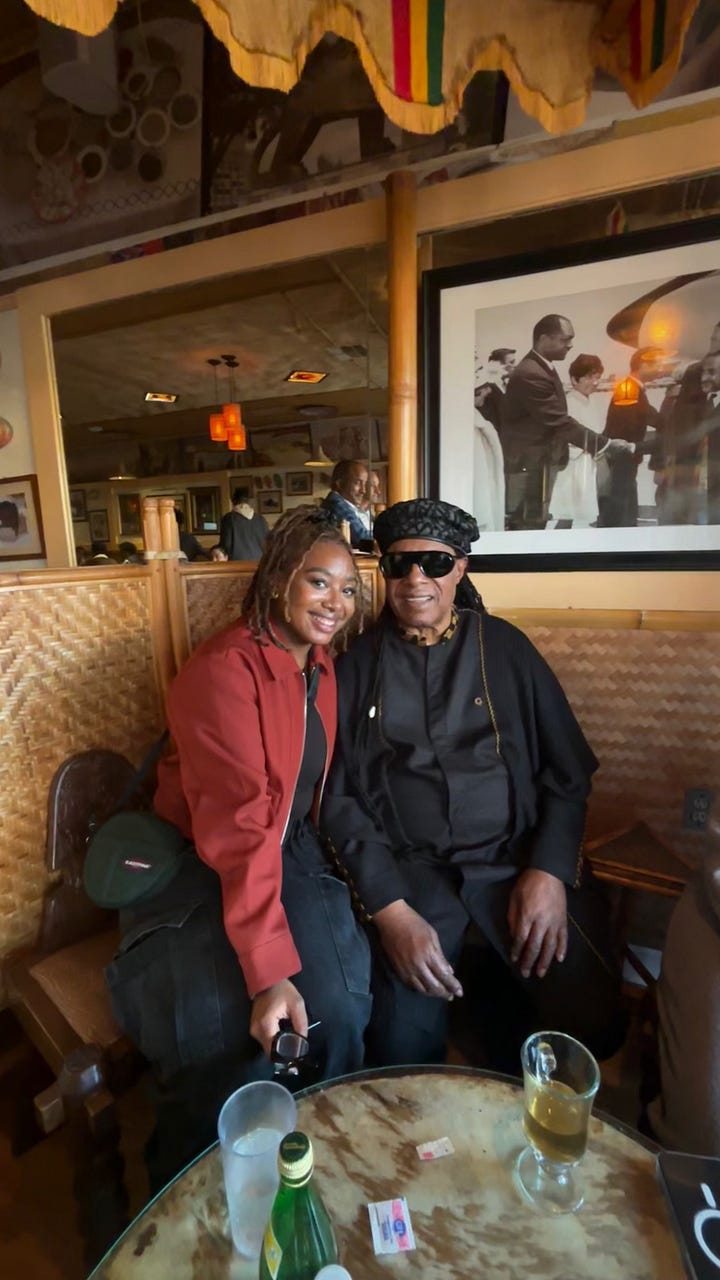

The joys of flying are often reserved for first-class and sometimes business-class customers. Wonder why the experience sucks? Read here
That’s all for today, friends and followers. Are you ready for the interview series to drop next Sunday? The time I spent writing today was focused on drafting questions and taking notes from our conversation. As always, thank you for reading and supporting the newsletter! If you have any news, trends, or phenomena you think I should write about or want to chat, feel free to email me at ellisellice@gmail.com.








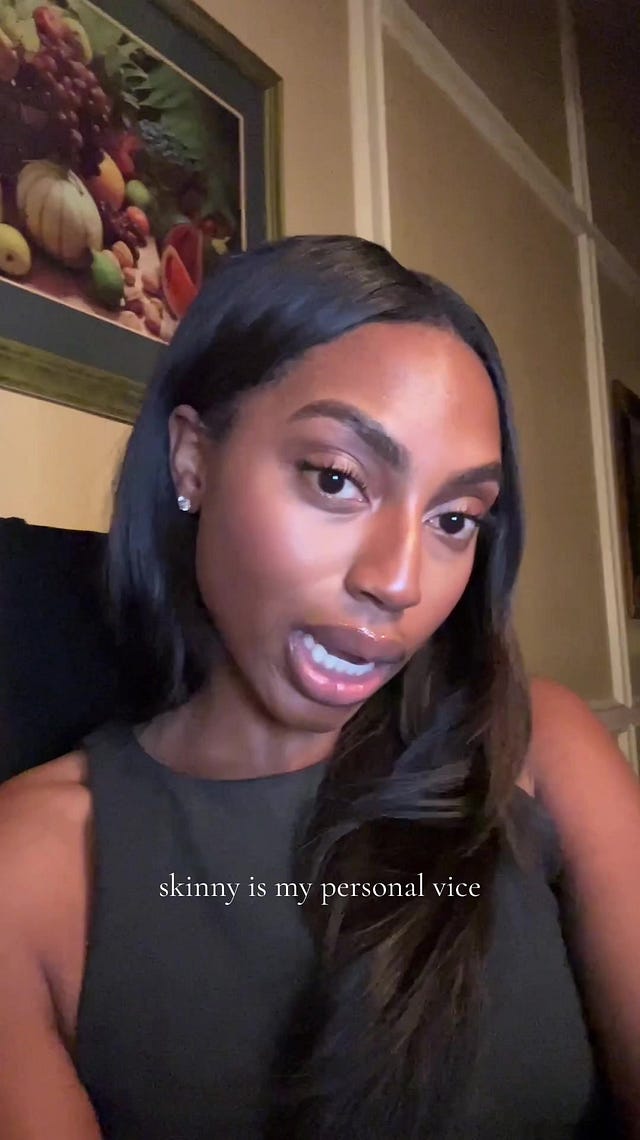

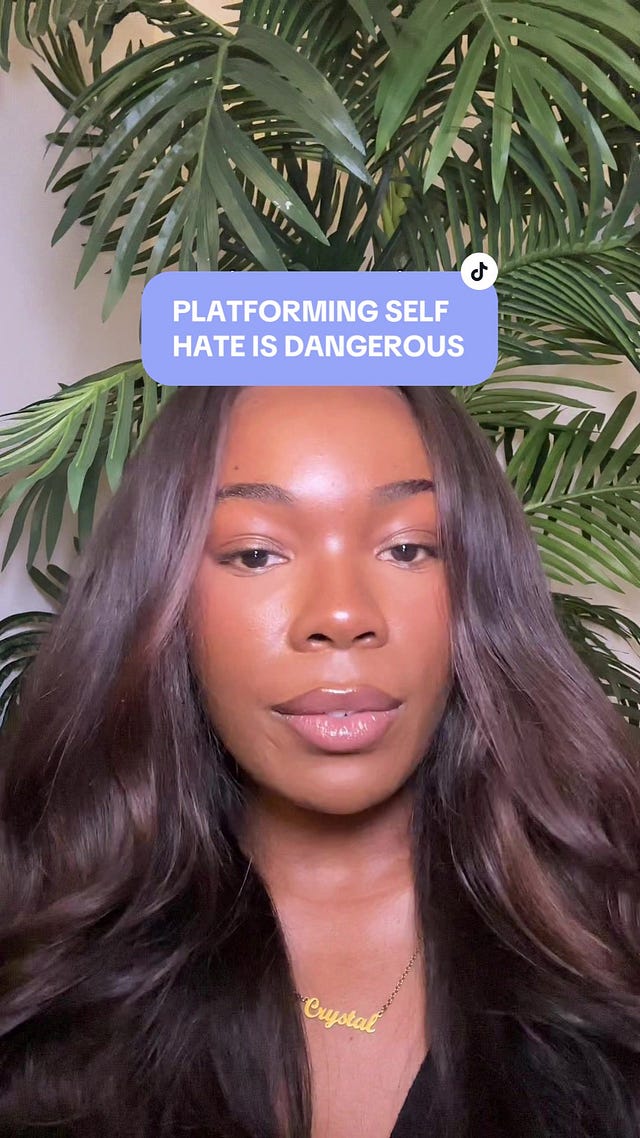
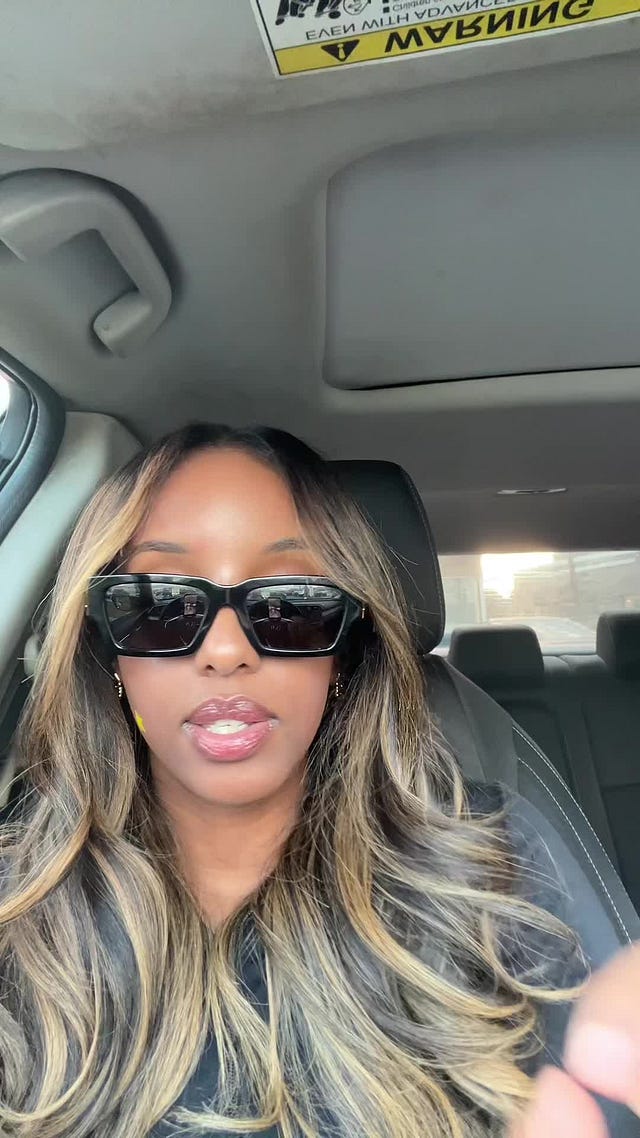

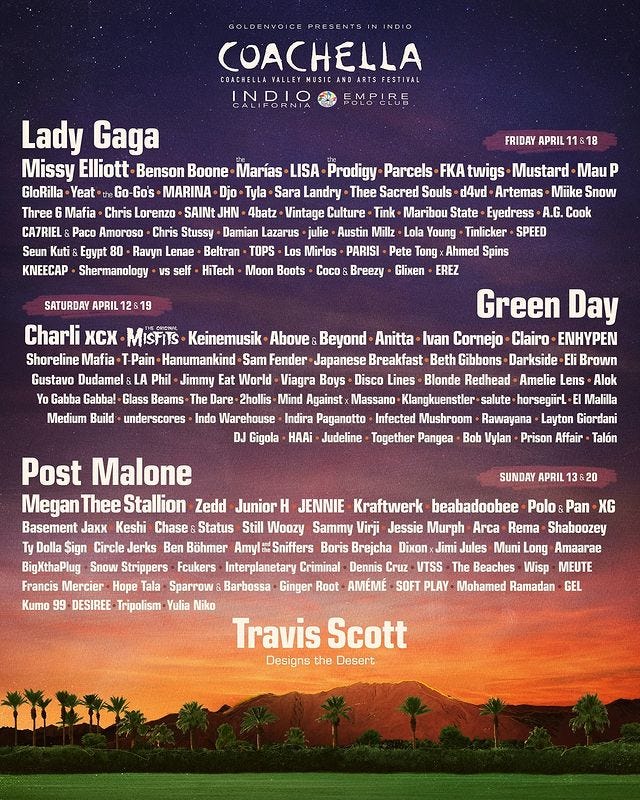



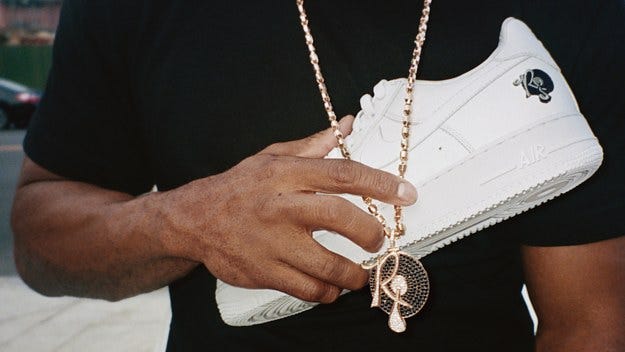


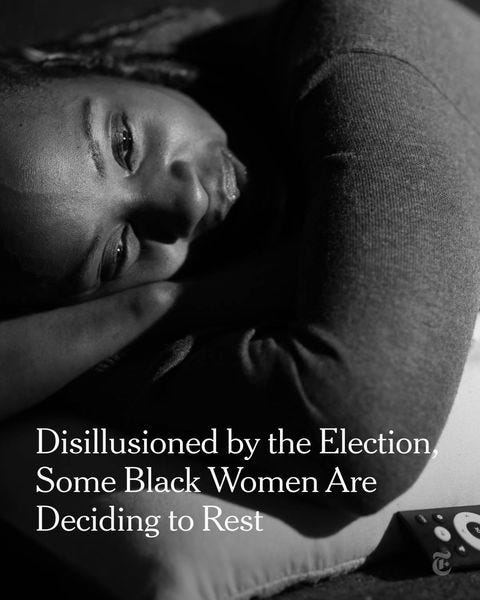
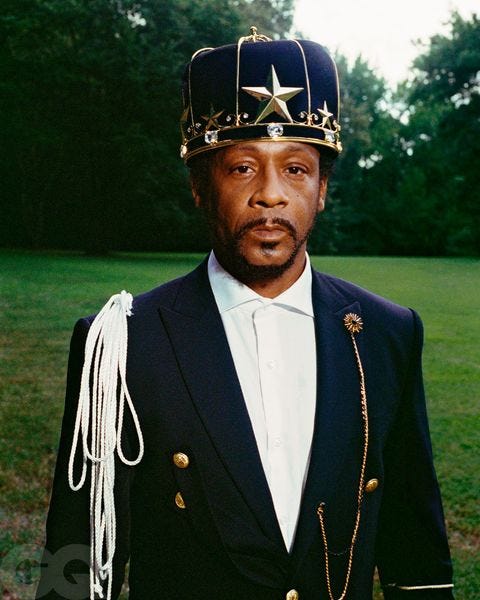

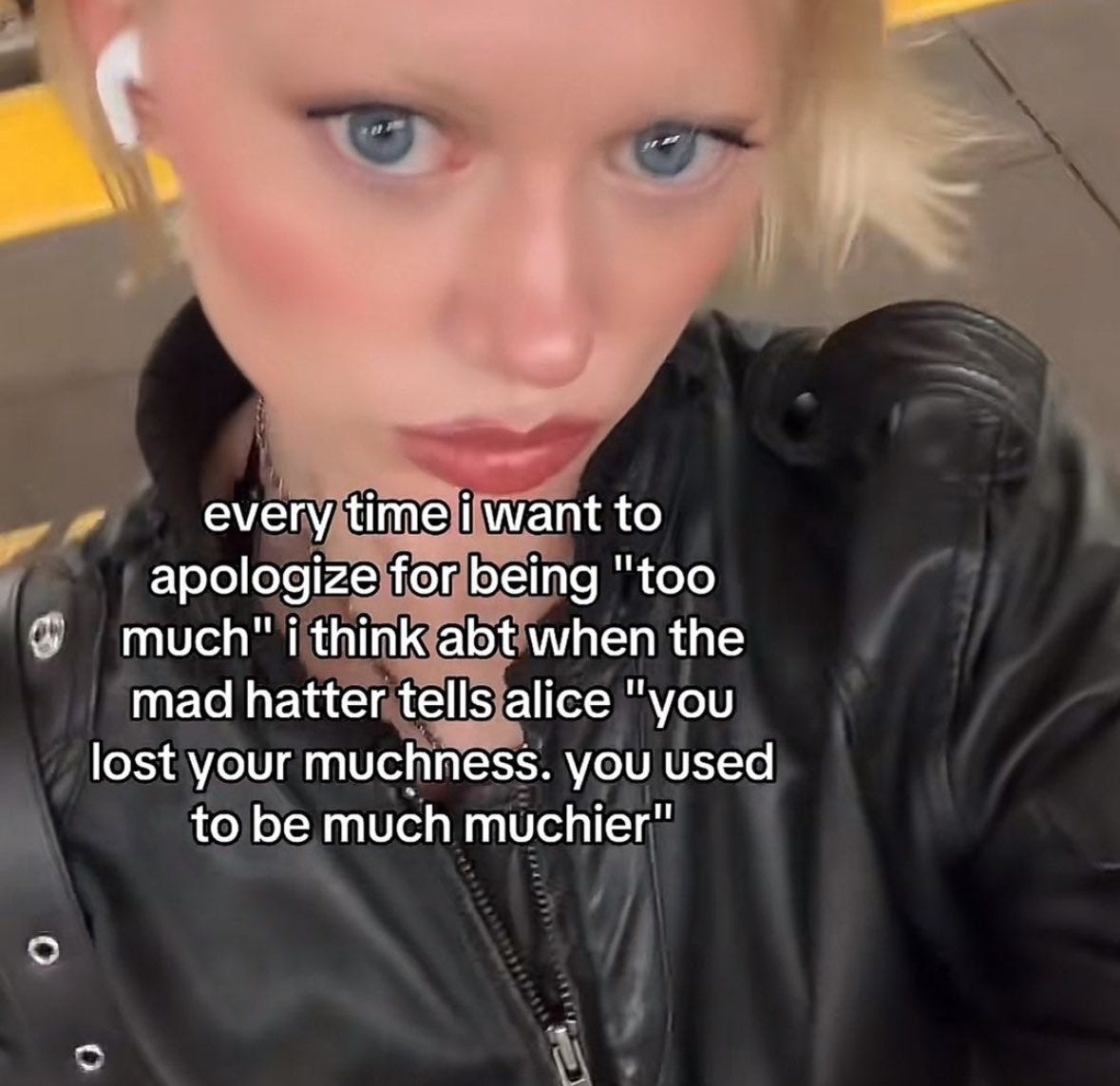

“2024 hasn’t been particularly easy for me; that’s another story for another day.”
I would love to have a recap of how this year went for you as like an end of year review because so many people I know (myself included) had a horrible or just super challenging year. But alas, it is the year that put pressure on rocks to help usher in diamonds.
I have been reading through “Fearing The Black Body” for the past couple of years! (It’s super dense so I’ve been taking breaks) I think I’m mid way. So I def need to finish soon.
For your poll: “Is it tone-deaf for an influencer to talk about chasing thinness, or is it just an honest expression?” It’s the WAY they talk about thinness. It would be different if influencers talk about the pressures and desires of their past and present situation. And acknowledge its harms. But to just state the desire to chase thinness with zero introspection and with a tone that alludes that that is ok is unproductive and regressive. You can tell people’s intentions by their tone and it’s clear when people are being honest and real versus inflammatory and irritating.